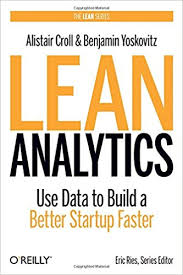Alistair Croll’s Topics:
- Cloud computing, the end of the IT monopoly, the rise of shadow IT, and what it means for enterprises.
- Big Data, and how a connected world is changing business, ethics, society, and even the human species.
- Entrepreneurship, and Lean approaches to growing companies from the perspective of both founders and funders.
- Setting corporate strategyand creating innovation programs in a period of high disruption and crumbling barriers to entry.
- Analytics, with a particular focus on gaining a comprehensive view of online presence, web performance, and monitoring. (Available as a full-day workshop too)
- Marketing and growth hackingin a post-press-release world.
- Financial technologyand disaggregation of the banking, payment, and financial markets.
- The gig economy and the business consequences of an on-demand workforce for everything from employment to insurance.
- Lean Analytics, and how to use data to build a better business faster—from the earliest of startups to the largest global corporation. Based on the best-selling Lean Analytics, which has been translated into eight languages, I’ve done twenty-minute keynotes and day-long workshops on the subject.
- The trifecta of data, agents, and interruption: How the rise of consumer big data, smart agents, and interruptive interfaces pave the way for the next decade of human-machine interaction, and what it means for the species.
- Just evil enough: The dirty secret behind every great startup is that they’re subversive. Somewhere in their history, they did something slightly evil that gave them a head start. If you’re not wondering how to be just a little bit naughty, you’ve probably already lost.
- How to think critically about data: Data can be a precious resource—a competitive advantage some have dubbed the “new oil.” But without proper refinement, data can be toxic, delivering spurious conclusions, reinforcing biases, and blinding us to what’s really happening. Building on the HBS course Big Data and Critical Thinking, this talk outlines a data science framework and demonstrates the many risky, immoral—and sometimes even hilarious—ways in which we make mistakes with data.
- The rise of music science: Music is digital, and that means it can be analyzed. But data is not only changing how we find and listen, but also what and for whom we create. Over the course of six months and seventy interviews, I’ve been looking at the intersection of technology and music, uncovering some of the hard “Turing problems” within music science and guessing at where we’re headed.
- Year Zero: Within ten years, we’ll each have a life feed that will be the dominant tool with which we run our lives. How will this change the face of humanity? How will we build for it? And what will it do to concepts like thoughtfulness and memory?
- Tilt the windmill: A generation ago, the average Fortune 500 company stayed on the list of big firms for over 50 years. Now, the average is down to less than 15 years. What changed? Dramatic reduction in coefficients of friction around starting, experimenting, and growing ideas; alongside the rise of the attention economy, have made it harder than ever for incumbents to stay on top. This is what they can do to fix it.
- Thrust and lube: For centuries, scale has been how the big got bigger. Now, it’s how well they lower the friction within their industry. Thrust matters less, and lube matters more. If you’re a business, knowing how to change your focus is the key to your survival.
- Moats, bridges, risk, and reward: Using the analogy of defensive moats and technological bridges, this talk aimed at risk, finance, and insurance industries examines how many traditional barriers to entry are at risk in a digital, personalized era.
- Discontinuous innovation, and the difference between incremental technology improvements and wide-ranging shifts that alter not only markets and business models, but also human culture and society at large.
- The unreasonable power and incredible fragility of AI: We hear a lot about how algorithms will replace jobs. But it turns out that much of machine learning is brittle and easily fooled. So what’s the future like—and how should we think about it?
In an attention-starved, always-connected world, we focus on that which captures our attention: What’s interesting.
Alistair helps organizations look at today’s most important issues from a different perspective. He finds the untold narrative, the subversive angle and the unexpected advantage. Alistair makes even the most complicated concepts clear and concise, putting them in a context your audience understands. And most importantly, he gives concrete takeaways and deliberate actions to apply the next day.
About Alistair Croll:
Alistair Croll has been an entrepreneur, author, and public speaker for over 20 years. In that time, he’s launched a number of companies, run accelerators, and chaired some of the world’s leading conferences on innovation, startups and emerging technology. He has:
- Launched and chaired a variety of leading technology events including Interop’s Enterprise Cloud Summit, the International Startup Festival, O’Reilly’s Strata, the Next:Money conference, Cloud Connect and Bitnorth.
- Published Managing Bandwidth, Complete Web Monitoring, and the best-selling Lean Analytics, as well as the forthcoming Different:Better with April Dunford; and e-books on Music Science and how to Propose, Prepare, and Present at conferences.
- Founded Networkshop, Application Performance startup Coradiant (acquired by BMC), event management tool Badger, the Year One Labs startup accelerator, Bitcurrent, Rednod and the RPM/Cloud.ca co-working space.
- Contributed to GigaOm, O’Reilly Radar, UBM Techweb, Human 2.0, music ‘zine Stupid Magazine and a variety of other online and print publications.
- Advised a wide range of early-stage companies including Localmind (acquired by AirBnB), Massive Damage, Orion Labs, FastSoft (acquired by Akamai), Nomnom Insights, Kindoma, Infoactive (acquired by Tableau), Datavized, Mixgenius, Rate The Future and Quiver.
- Consulted and spoken on innovation for a range of large organizations such as DHL, Google, Aon Benfield, Recruit Holdings, Schibsted Media, NCARB, Pingan Bank, Blackbaud, the British Broadcasting Corporation, Huawei, Optimal Payments, the White House, Unisys, Naspers and Teradata.


